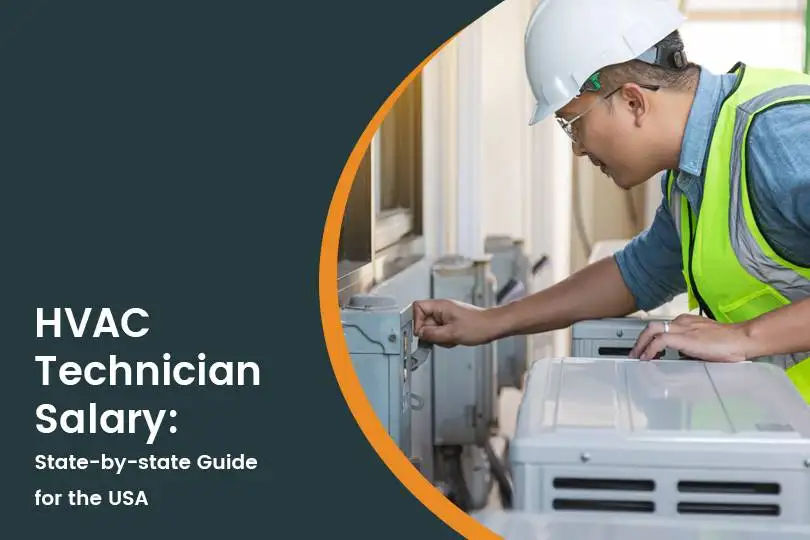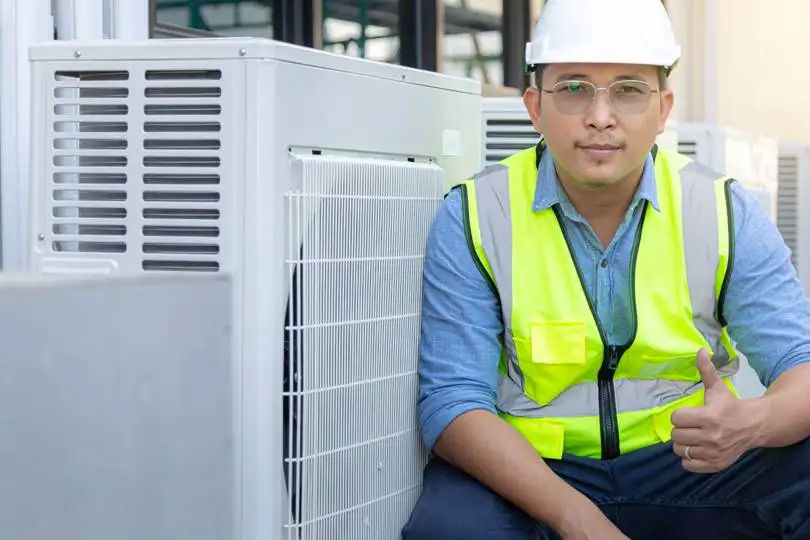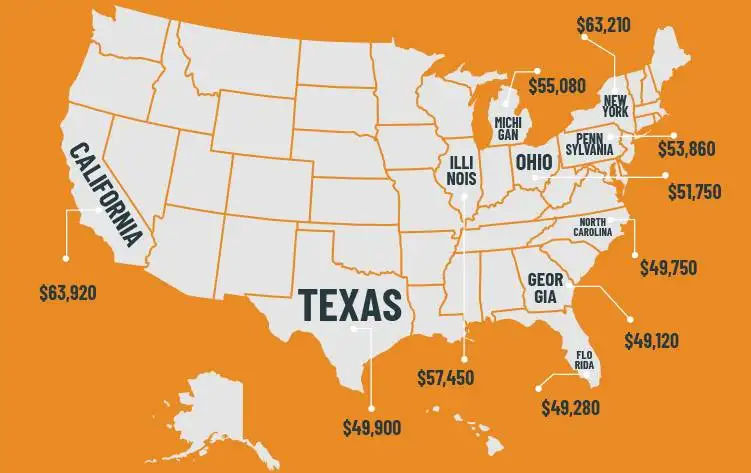HVAC Technician Salary: U.S. Guide State by State in 2025

Embarking on a career as an HVAC (Heating, Ventilation, and Air Conditioning) technician can be a rewarding journey, both professionally and financially. As the demand for skilled technicians continues to rise across the United States, understanding the HVAC technician salary landscape on a state-by-state basis becomes crucial.
Ready to get started with Field Promax?
Sign Up FreeIn this comprehensive guide, we’ll explore the average HVAC technician salaries, and factors influencing variations, and provide insights to help aspiring technicians make informed career decisions.
But first, let us clarify some basic concepts about an HVAC technician’s job.
HVAC Technician Annual Salary (2019-2023)
(Source: https://faradaycareers.com/careers/hvac-technician-salary)
Furthermore, technicians with specialized skills and certifications, like those from organizations such as the North American Technician Excellence (NATE), often command higher HVAC tech salaries. Moreover, the robust demand for HVAC services across the country, driven by both residential and commercial needs, contributes to a positive outlook for income growth and job stability.
Beyond basic HVAC salary, HVAC technicians may also find opportunities for additional profit through overtime work, especially during peak seasons, and bonuses for exceptional performance. With the increasing focus on energy efficiency and environmental sustainability, technicians specializing in the installation and maintenance of eco-friendly HVAC systems may find themselves in higher demand, potentially leading to increased earning opportunities. Overall, the HVAC industry offers a pathway to financial success, with the potential for steady income and opportunities for skilled technicians to enhance their earning prospects through continued education and specialization.
Job Role and Responsibilities of an HVAC Technician

Before we start exploring the details of HVAC tech pay, let us understand a bit more about the job profile itself. In other words, you need to know what is the job role and responsibilities of an HVAC technician before you try to understand what they may get paid in the US.
HVAC Technician Job Role An HVAC technician plays a crucial role in ensuring the proper functioning of heating, ventilation, and air conditioning systems. These skilled professionals are responsible for installing, repairing, and maintaining HVAC equipment in residential, commercial, and industrial settings. Their job involves inspecting heating and cooling systems, identifying issues, and performing necessary repairs or replacements.
HVAC technicians also conduct routine maintenance to ensure systems operate efficiently, preventing breakdowns and minimizing energy consumption. Moreover, they may install new HVAC units, assess airflow, and calibrate thermostats to optimize performance. Beyond technical skills, effective communication is vital, as HVAC technicians often interact with clients to explain issues, provide solutions, and offer guidance on equipment usage.
Job Responsibilities of an HVAC Technician
- Installation: HVAC technicians are responsible for installing heating, ventilation, and air conditioning systems in residential, commercial, and industrial settings. This involves setting up new units and ensuring they meet safety and performance standards.
- Repair and Maintenance: HVAC technicians diagnose and repair malfunctions in HVAC systems. They conduct regular maintenance to prevent issues, replace faulty parts, and optimize system efficiency to ensure it operates smoothly.
-Inspection: Technicians inspect existing HVAC systems to identify problems, assess the condition of components, and recommend necessary repairs or replacements. This proactive approach helps prevent major breakdowns.
- Calibration and Adjustment: HVAC technicians calibrate thermostats, adjust airflow, and fine-tune various system components to ensure optimal performance. This includes checking and adjusting controls to maintain the desired temperature and humidity levels.
- Customer Interaction: Effective communication is crucial, as HVAC technicians often interact with clients. They explain issues, present solutions, and offer guidance on proper equipment usage. Clear communication builds trust and enhances customer satisfaction.
- Safety Compliance: HVAC technicians adhere to safety protocols and standards. They ensure that all installations and repairs meet safety regulations, protecting both themselves and the occupants of the buildings they work in.
- Documentation: Technicians maintain detailed records of their work, including installation details, repairs performed, and parts replaced. Accurate documentation is essential for tracking system history and providing insights for future maintenance needs.
Before you ask how much does an HVAC technician make in the USA, you need to understand the basic criteria for becoming an HVAC technician. Only if you fulfill them, you can expect to get a job as an HVAC technician and earn that kind of salary.
Here’s a simplified guide to the key prerequisites:
Education While a high school diploma or equivalent is the minimum requirement, pursuing post-secondary education, such as an HVAC certificate or associate degree from a vocational school or community college, is highly beneficial. These programs cover essential topics like system design, troubleshooting, and safety protocols.
On-the-Job Training Many aspiring HVAC technicians participate in apprenticeships or on-the-job training programs. These initiatives provide hands-on experience under the guidance of experienced technicians, helping individuals apply theoretical knowledge to practical situations. While not mandatory, obtaining certification from recognized organizations like North American Technician Excellence (NATE) or the Refrigeration Service Engineers Society (RSES) can significantly enhance job prospects. Certification validates a technician’s skills and knowledge, often leading to a higher HVAC technician salary.
Licensing HVAC technicians must comply with state-specific licensing requirements. States may have different criteria, but generally, technicians need to pass an exam demonstrating their understanding of HVAC systems, safety protocols, and relevant regulations.
Skills Development HVAC technicians need a diverse skill set, including strong mechanical aptitude, troubleshooting abilities, and proficiency in reading blueprints and technical manuals. Communication skills are also crucial for interacting with clients and explaining technical issues in simple terms.
Physical Fitness The job may involve lifting heavy equipment, working in confined spaces, and standing for extended periods. With the growing trend of health-consciousness, many HVAC technicians are turning to tools like fitness app development to track their physical activity and maintain the fitness levels required for their demanding roles. In summary, the path to becoming an HVAC technician involves a combination of education, hands-on experience, certification, licensing, and the development of essential skills. These requirements not only ensure a technician’s competence but also contribute to a higher HVAC pay scale, reflecting the value of their expertise in maintaining and repairing critical heating and cooling systems.
Scope of Earning as an HVAC Technician in the USA
As an HVAC technician in the USA, the scope for earning and profit is promising, reflecting the growing demand for skilled professionals in the field. According to the U.S. Bureau of Labor Statistics (BLS), the median annual wage for HVAC technicians was $51,420 as of May 2023. Although the earning potential varies based on factors such as experience, certifications, and geographic location, it indicates a steady growth according to the data collected by the BLS in the last three years. In 2020, the lowest 10% of HVAC technicians earned around $31,000 per year, while the top 10% earned around $80,000 per year. The job outlook for HVAC technicians is positive and is projected to grow 5% from 2020 to 2030. This number could increase even further with the country’s focus on creating greener and more efficient buildings.
HVAC Technician Salary: State-by-State Breakdown

Now, let’s explore the HVAC service technician salary guide state by state, highlighting average HVAC pay in each state, notable trends, and factors that contribute to variations.
California Average Salary: $63,920
Noteworthy Factors: California’s higher cost of living contributes to elevated salaries. Demand for HVAC services is driven by the state’s diverse climate.
Texas Average Salary: $49,900
Noteworthy Factors: With a growing population and diverse climate conditions, Texas offers a steady demand for HVAC services. However, salaries are influenced by the state’s lower cost of living.
New York Average Salary: $63,210
Noteworthy Factors: New York’s HVAC technicians benefit from a robust job market and the state’s focus on energy-efficient systems. The cost of living in urban areas impacts salary levels.
Florida Average Salary:** $49,280
Noteworthy Factors: Florida’s warm climate sustains a consistent demand for HVAC services. The HVAC pay scale here reflects the state’s moderate cost of living.
Illinois Average Salary: $57,450
Noteworthy Factors: Illinois experiences temperature extremes, contributing to the need for reliable HVAC systems. Urban areas may offer higher salaries due to increased demand.
Pennsylvania Average Salary: $53,860
Noteworthy Factors: HVAC technicians in Pennsylvania benefit from diverse weather conditions, creating a consistent demand for heating and cooling services.
Ohio Average Salary: $51,750
Noteworthy Factors: Ohio’s industrial and residential sectors drive demand for HVAC technicians. Salaries are influenced by a moderate cost of living.
Georgia Average Salary: $49,120
Noteworthy Factors: Georgia’s warm climate and growing population contribute to steady demand. Salaries are competitive with the state’s cost of living.
North Carolina Average Salary: $49,750
Noteworthy Factors: HVAC technicians in North Carolina benefit from a mix of climate conditions and a growing economy, influencing salary levels.
Michigan Average Salary: $55,080
Noteworthy Factors: Michigan’s variable climate creates demand for both heating and cooling services. Urban areas may offer higher salaries.
Factors Impacting HVAC Technician Salary Variations
Understanding why HVAC technician salaries vary across states involves examining various factors that contribute to these differences.
Cost of Living States with higher costs of living tend to offer higher HVAC tech salaries to offset expenses. Urban areas within a state may also have different living costs.
Geographic Location Salaries can vary significantly based on the state and even within different regions of the same state. Factors such as the cost of living and demand for HVAC services contribute to these variations.
Demand for HVAC Services States with extreme temperatures or rapidly growing populations often have higher demand for HVAC services, influencing salary levels.
Industry Specialization Technicians specializing in commercial or industrial HVAC systems may command higher salaries than those primarily working in residential settings.
Experience and Expertise HVAC technicians with more experience and specialized expertise often command higher salaries. Certification and additional training can also impact earning potential.
Unionization HVAC technicians in states with strong labor unions may benefit from collective bargaining, resulting in competitive salary structures.
Education and Certification States with higher educational and certification requirements may have technicians with elevated earning potential.
For more information, contact Field Promax
We're here to help you get started
HVAC Technician Job Requirements
Before you ask how much does an HVAC technician make in the USA, you need to understand the basic criteria for becoming an HVAC technician. Only if you fulfill them, you can expect to get a job as an HVAC technician and earn that kind of salary.
Here’s a simplified guide to the key prerequisites:
Education
While a high school diploma or equivalent is the minimum requirement, pursuing post-secondary education, such as an HVAC certificate or associate degree from a vocational school or community college, is highly beneficial. These programs cover essential topics like system design, troubleshooting, and safety protocols.
On-the-Job Training
Many aspiring HVAC technicians participate in apprenticeships or on-the-job training programs. These initiatives provide hands-on experience under the guidance of experienced technicians, helping individuals apply theoretical knowledge to practical situations. While not mandatory, obtaining certification from recognized organizations like North American Technician Excellence (NATE) or the Refrigeration Service Engineers Society (RSES) can significantly enhance job prospects. Certification validates a technician’s skills and knowledge, often leading to a higher HVAC technician salary.
Licensing
HVAC technicians must comply with state-specific licensing requirements. States may have different criteria, but generally, technicians need to pass an exam demonstrating their understanding of HVAC systems, safety protocols, and relevant regulations.
Skills Development
HVAC technicians need a diverse skill set, including strong mechanical aptitude, troubleshooting abilities, and proficiency in reading blueprints and technical manuals. Communication skills are also crucial for interacting with clients and explaining technical issues in simple terms.
Physical Fitness
The job may involve lifting heavy equipment, working in confined spaces, and standing for extended periods. With the growing trend of health-consciousness, many HVAC technicians are turning to tools like fitness app development to track their physical activity and maintain the fitness levels required for their demanding roles. In summary, the path to becoming an HVAC technician involves a combination of education, hands-on experience, certification, licensing, and the development of essential skills. These requirements not only ensure a technician’s competence but also contribute to a higher HVAC pay scale, reflecting the value of their expertise in maintaining and repairing critical heating and cooling systems.
Conclusion
Aspiring HVAC technicians must consider not only their passion for the field but also the practical aspects of potential earnings and career growth. While state-by-state HVAC technician salary variations exist, the demand for skilled HVAC technicians remains high across the nation. By staying informed about HVAC industry trends, pursuing relevant certifications, and assessing the unique factors influencing salaries in their preferred location, individuals can make informed decisions that lead to a fulfilling and financially rewarding HVAC career.
If any trained and experienced HVAC professionals aspire to make the most of the opportunities, it is always a smart move to start their own HVAC business rather than seek employment. As an independent business, the scope to make money is far more than earning a salary.
In case you are worried about managing a business on your own, we have a great solution for you! Sign up for Field Promax HVAC business software. This is an extraordinary software solution that provides a 360-degree automation solution to your business and makes running a company easier than this. It streamlines all the tedious, repetitive tasks, including scheduling and dispatching, work order management, estimating, monitoring, reporting, time-tracking, inventory management, document management, invoicing, and even letting you receive online payment right from the job site. Field Promax also supports seamless integration with QuickBooks, simplifying accounting and bookkeeping for business owners.
The result? You spend less and worry less about running your business and focus more on the important tasks, i.e., delivering high-quality HVAC service to your customers.
So, what are you waiting for? Sign up for Field Promax and realize your dream of becoming an entrepreneur and earning as much profit as you can imagine.